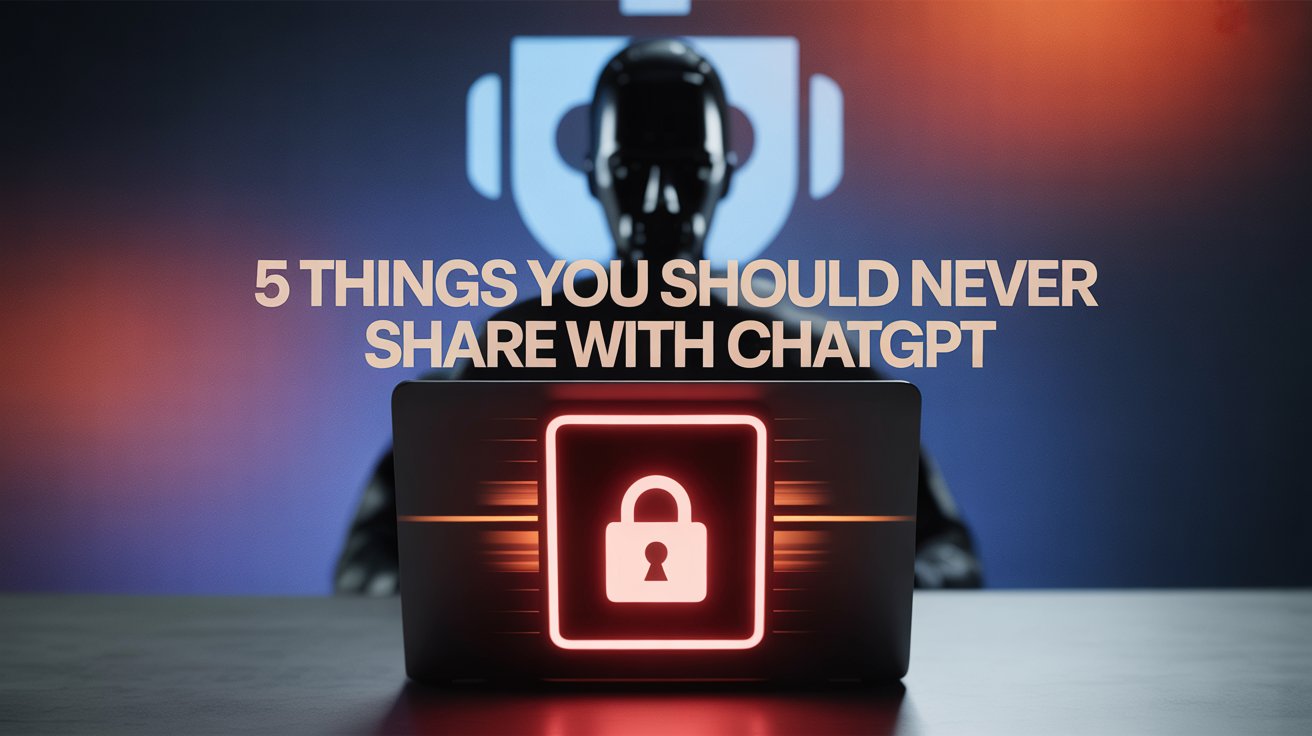
5 Things You Should Never Share with ChatGPT Here’s Why
Artificial Intelligence (AI) tools like ChatGPT are now part of many people’s daily routine. They help us write content, answer questions, solve problems, and even chat like a friend. While this technology is helpful, many people forget that it’s still a machine not a human.
No matter how smart ChatGPT may seem, there are some things you should never share with it. Some details are too personal or sensitive to be shared with any online tool, including AI. In this article, you’ll learn about the 5 most important things you should never share with ChatGPT, and why it’s dangerous to do so.
Let’s break it down clearly and simply.
1. Personal Identifiable Information
What Is It?
Personal Identifiable Information, often called PII, is any piece of information that can tell someone who you are. These are the personal details we often share without thinking like your full name, phone number, home address, email, date of birth, or even your Aadhaar, PAN, or passport number.
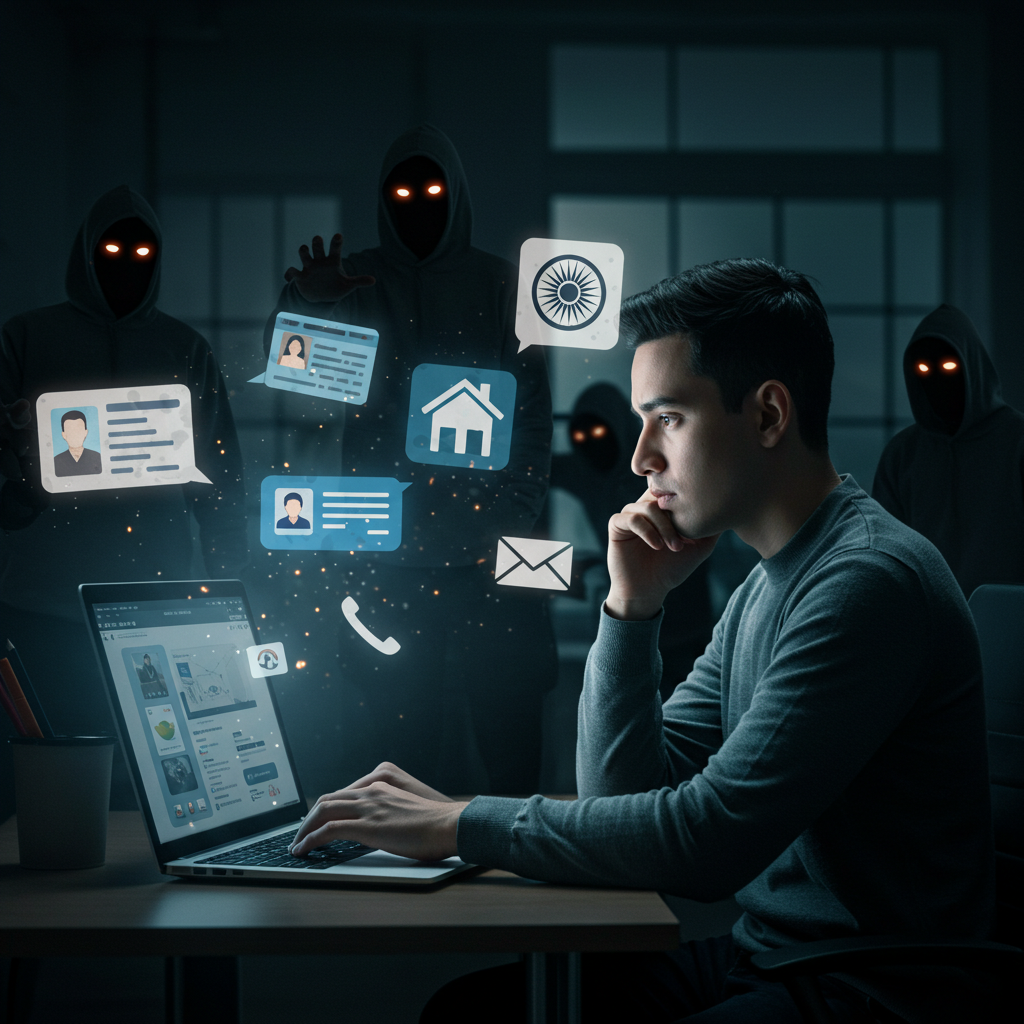
Why It’s Risky to Share with ChatGPT
Imagine this: you’re casually chatting with an AI tool, and you mention your full name and Aadhaar number while asking a question. It might seem harmless in the moment, but it’s not. Even though ChatGPT is designed to keep your data private, it still runs on the internet and nothing online is 100% secure.
If a hacker somehow gains access to that information, they could misuse it. For example, they might apply for loans in your name, try to hack into your bank account, or carry out online scams pretending to be you. The scary part? You might not even realize it until the damage is already done.
Real-Life Example
Let’s say someone knows your name and Aadhaar number. With just that, they might be able to bypass certain security checks and commit fraud, leaving you stuck proving it wasn’t you.
How to Stay Safe
The best way to protect yourself is to never type your personal information into any chatbot, no matter how safe it seems. That includes your name, address, contact details, or anything that can reveal who you are. Think of it like this: if you wouldn’t share it with a stranger on the street, don’t share it with AI either.
2. Financial or Banking Information
What Is It?
Your financial information includes anything related to your money or bank accounts. This can be:
- Your credit or debit card number
- Bank account number
- UPI ID (like Google Pay or PhonePe)
- Net banking username and password
- CVV number (the 3-digit code on the back of your card)
- OTPs (One-Time Passwords used during transactions)
These details may seem like small pieces of information, but together they can give someone full access to your money.
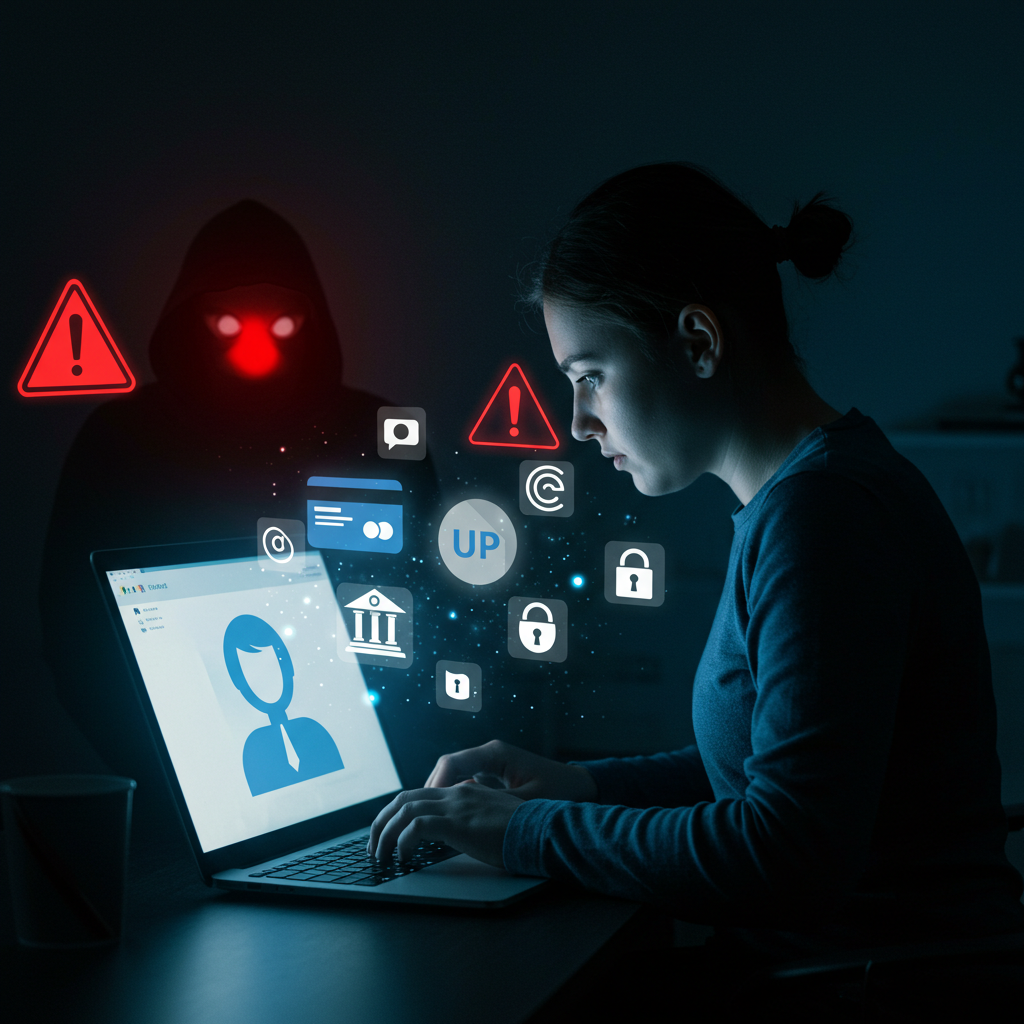
Why It’s Dangerous to Share with ChatGPT
Let’s say you’re having trouble with an online payment and you type your card details into ChatGPT asking for help. Even though ChatGPT is designed not to remember personal data, there is always a small chance that your information could be misused especially if you’re on a public device or using an insecure internet connection.
Hackers and scammers are always looking for ways to steal money. If they get your card number or bank login, they can make fake transactions, withdraw your money, or even make purchases in your name. Once the money is gone, it’s very hard to get it back.
Also, it’s important to remember: ChatGPT is not connected to your bank. It can’t fix payment issues, check your account balance, or cancel a transaction. So, there’s no real reason to share such sensitive information here.
Real-Life Example
Imagine typing your credit card number and CVV while asking for help with a failed payment. If someone managed to see that message or if your device was infected with malware, your money could be gone in minutes.
How to Stay Safe
Always use official banking apps or websites when dealing with your money. Never share your financial information with any chatbot, email, or message not even with AI. If you have a problem with payments or your bank account, contact your bank’s customer care directly.
3. Passwords and Login Credentials
What Is It?
Your passwords and login details are the digital keys to your online world. These include:
- Your email or social media usernames
- Passwords for any websites or apps
- PIN numbers used for banking or unlocking devices
- Answers to security questions (like your mother’s maiden name or your first school)
These details are private for a reason they help protect your identity, data, and money online.
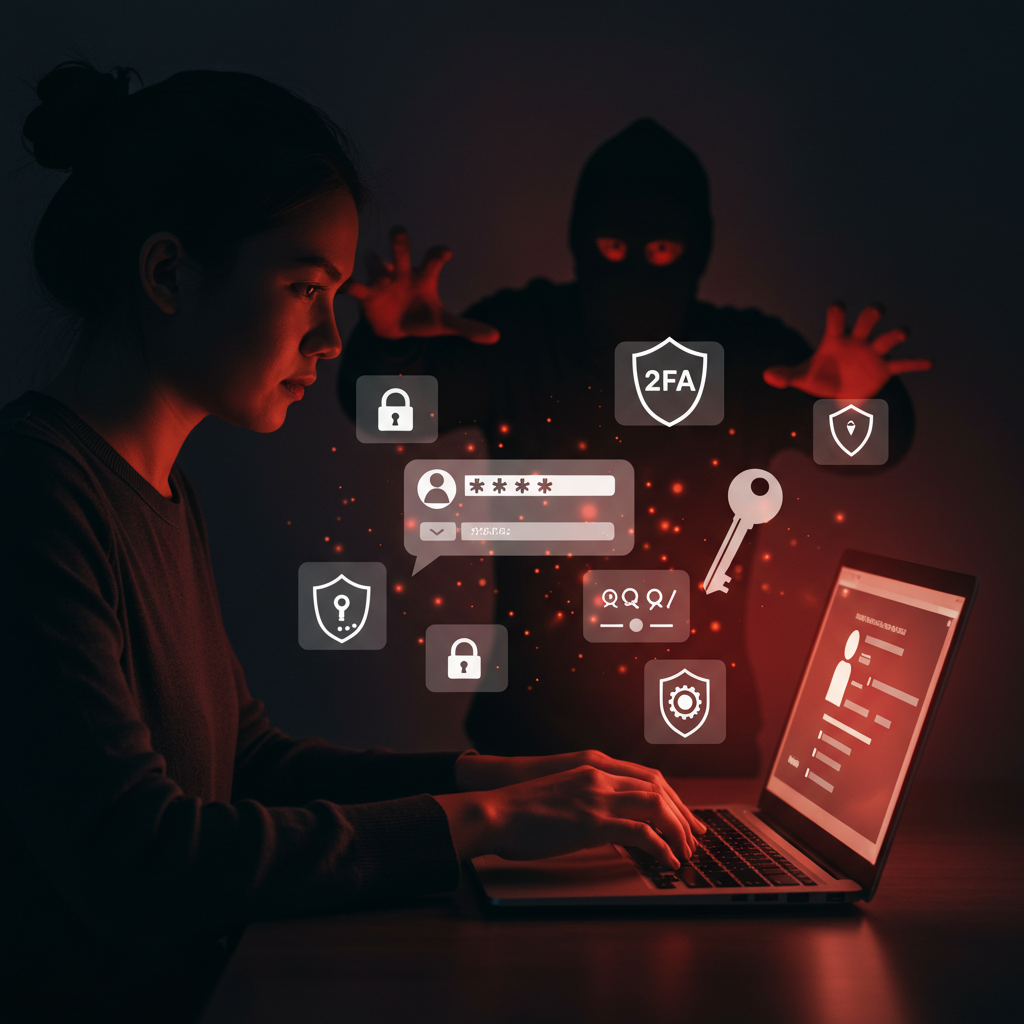
Why It’s Risky to Share with ChatGPT
Imagine handing over the keys to your house to a complete stranger. That’s what it’s like when you share your password even by accident in an online chat. If someone sees or intercepts that information, they could easily take control of your accounts.
For example, if a hacker gets your email and password, they might:
- Read your personal messages
- Pretend to be you and scam your friends
- Access your bank or shopping accounts
- Lock you out of your own profiles
It’s important to understand that ChatGPT cannot log in to websites or apps for you, so there’s absolutely no reason to ever type your passwords here. Even if the AI doesn’t save your data, once the password is written in a chat, it becomes unsafe especially if someone else uses your device or your browser stores history.
Real-Life Example
Let’s say you forgot your social media password and decide to share your old passwords with ChatGPT to “figure it out.” If that message is somehow accessed later (for example, if your browser is hacked), someone could try those passwords to break into your account.
How to Stay Safe
Use a trusted password manager to store all your login details securely in one place. These tools encrypt your data and make it harder for anyone else to access. Also, always turn on two-factor authentication (2FA) on important accounts like email, banking, or social media—it adds an extra layer of protection, even if your password is leaked.
4. Private or Confidential Information
What Is It?
Private or confidential information includes anything personal that you wouldn’t want others to know. This could be:
- Family problems or relationship issues
- Your health or mental wellness concerns
- Legal matters like disputes or court cases
- Office documents, business emails, or internal company updates
In simple terms, it’s the kind of stuff you’d only share with someone you deeply trust like a doctor, a lawyer, or a close family member.
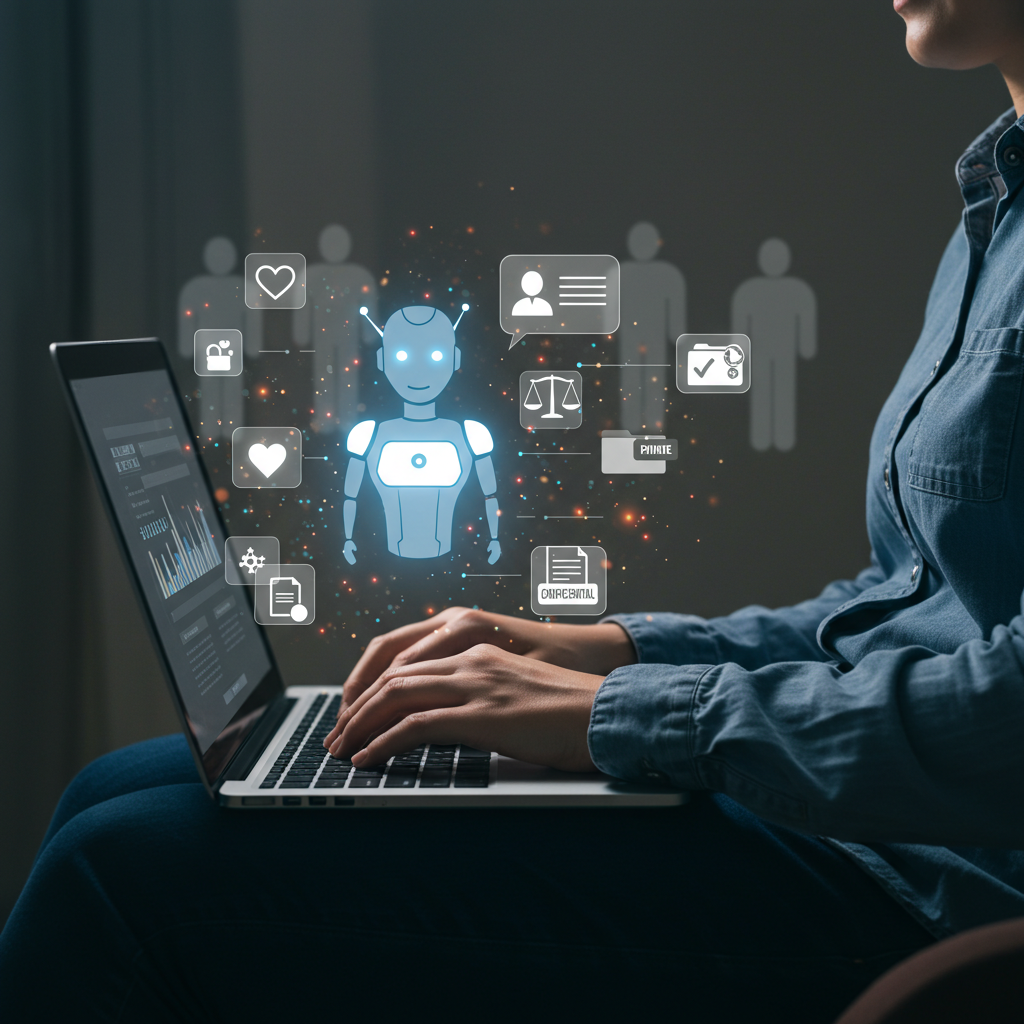
Why It’s Risky to Share with ChatGPT
Even though ChatGPT might feel like a friendly listener, it’s still just a computer program. It doesn’t truly understand emotions, and it doesn’t know the full picture of your situation. So even if it gives you advice, that advice might not be helpful or worse, it might be completely wrong.
Also, you should know that some conversations may be reviewed later by humans to help improve the AI. So if you’re typing out something sensitive like a family issue or details about your job it might be seen or stored for training or analysis, even if not intentionally.
In work settings, this can become even more serious. If you share confidential business details or internal documents with any outside platform, including ChatGPT, you might break company rules. This could lead to serious consequences like losing your job or facing legal trouble.
Real-Life Example
Imagine you’re stressed at work and share your company’s upcoming product launch details with ChatGPT, asking for help with a press release. If that information is leaked somehow, it could harm your company and you could be held responsible for it.
How to Stay Safe
Use ChatGPT only for general, non-sensitive help like learning a new skill, getting writing tips, or asking for general advice. But when it comes to deeply personal, emotional, legal, or work-related matters, it’s always better to talk to a qualified professional or someone you trust in real life.
5. Intellectual Property or Secret Ideas
What Is It?
Intellectual property means your original ideas things that come from your own creativity and hard work. These can include:
- New business plans or strategies
- Unique app or website ideas
- Book drafts, blog posts, or scripts
- Unpublished logos, designs, or artwork
- Inventions or product ideas that you plan to patent
In short, it’s anything original that you’ve created and haven’t shared with the world yet.

Why It’s Risky to Share with ChatGPT
Let’s say you’ve come up with a brilliant idea for a mobile app. You ask ChatGPT for feedback or suggestions by typing out all the details. Even though the AI doesn’t store personal data by default, there’s no 100% guarantee that your idea won’t be seen or used later especially if policies change or if a human happens to review that chat during quality checks.
Once you share an unprotected idea online even with a chatbot it becomes vulnerable. Someone else might copy it, publish it, or register it before you do. And if it isn’t legally protected with a patent or copyright, you may lose your claim over it.
Real-Life Example
Imagine you’re writing a novel and you share your plot and character details with ChatGPT for suggestions. Later, you find a very similar story published online. Whether it was a coincidence or not, you’d have no legal proof that the idea was originally yours because you never protected it properly.
How to Stay Safe
If you’re working on something unique or valuable, always protect it first. You can apply for a copyright, trademark, or patent depending on what it is. Don’t share your complete ideas, plans, or designs with anyone especially not online until they are legally yours.
Use ChatGPT for general brainstorming, but avoid typing out full ideas that are not yet public or protected. Think of your ideas like treasure keep them safe until they’re fully secured.
Also Read:
Final Thoughts
AI tools like ChatGPT have become a part of our daily lives. They can help you write emails, come up with creative ideas, explain difficult topics, and even have friendly conversations. It’s a powerful and helpful tool but like all tools, it must be used carefully.
As smart as ChatGPT may seem, it’s important to remember what it is and what it isn’t. It’s not a human who can fully understand your emotions. It’s not your personal diary. And it’s definitely not a place to share private or sensitive information, especially anything related to your identity, money, or unique ideas.
Think of ChatGPT as a helpful assistant not a trusted friend or a secure vault. When used wisely, it can save you time and make your life easier. But if you share the wrong kind of information, it can put your privacy, money, or future projects at risk.
So always keep these 5 things in mind and never share them with any AI tool:
- Personal Identifiable Information
- Financial or Banking Information
- Passwords and Login Credentials
- Private or Confidential Information
- Intellectual Property or Secret Ideas
Stay smart. Stay safe. Use AI the right way.
Thanks For Visiting primehighlights.com



